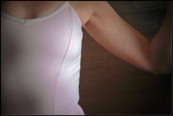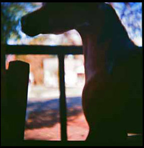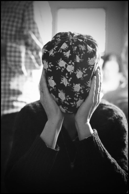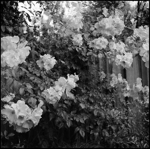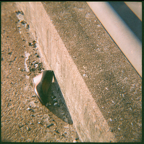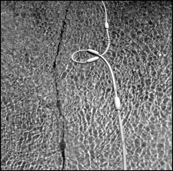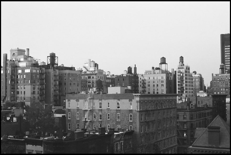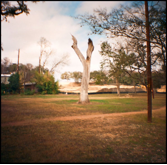Visions of a Failed Ballerina
by Laurie Saurborn
Nearing thirty and walking on the Marcellus Shale, Mina pauses when Gould asks her to marry him. In the small, quick window of her hesitation, she compares her studio apartment in the city to his three-story brownstone with the park green opposite. Regarding the white gold band embedded with a sapphire stone lying in his outstretched palm, she tries to recall her neighbors, arguing in Russian behind the walls and through the Stravinsky on her stereo, with tenderness.
Large trucks rumble by, their pale tanks filled with a mixture of water, sand, salt and benzene to shoot into the Earth. Their thick tires kick grit up into the midday air. Like Gould’s question, this disruption is a new development. After losing his childhood home in the most recent East Coast hurricane, his family leased a portion of their Pennsylvania land and its untapped reserves to an oil company.
Yes, Mina says. Yes. Because of the truck noise Gould cannot hear her first reply, so she has to answer twice. Yes. It is impossible to rationalize as simply friendly, the behavior of the man living in the apartment below hers, a wiry guy in his forties who twice pinned her to the stairwell wall with only his chest against her chest and his mouth on her neck (Sugar plum, he’d whisper, closing in.). It is no longer worth enduring the deep layer of pigeon shit coating the narrow balcony of the fire escape where her damp leotards dry in summer.
After sex that night her husband-to-be tells stories of houses raised up into the air. “For repair,” he says. “As in after a flood.” But Mina has yet to see a flood. Around her, water keeps to its usual places.
Soon after Mina’s aunt gives her away, Gould, a petroleum geologist, travels to the Dakota oil fields while Mina remains in their Lancaster farmhouse, a building Gould had lifted from its lot on a flood plain at the edge of town and moved to the highest point in a field once farmed for grain. It sits level now, but when Mina envisions their house she sees it as it was: elevated, water-damaged, disheveled. A house, looking homeless.
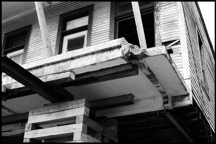
Vision 1: Relevé
Because a hurricane destroyed his parents’ house with rain and river water, when not in use Gould prefers to keep the furniture in the farmhouse hoisted close to the ceiling using a complicated system of wheels and belts. Initially this is a testament to teamwork, the way husband and wife move in concert to level the bottom of the couch to a plane of space three inches above their heads. They are exactly the same height, if Mina slumps. Being naturally the same height as someone else is also a testament to teamwork, though uncontrollable.
In the backyard a wide wooden platform rises on a tall pole. Positioned in the Phyllostachys nigra—the black bamboo—it is a place where peregrine falcons nest. Once mated, the mother falcon staggers egg laying to increase chances one of her offspring will survive to adulthood. Inside the re-anchored farmhouse are mirrors, thin and antique, hung on various walls, but none in which Mina can see her entire body.
Despite the injuries, her dream persists: to dance The Rite of Spring, alone. Under the furniture, she works to set the stage. She pulls slippers over her tight-covered feet. Stretching her fingertips toward an empty place on the ceiling, she drops them and takes a small spade in her hand. Spade. Space. Bend from the waist and position the feet. Scatter dirt over the floor. She tugs off the slippers. By evening the feet of her tights are dark with potting soil.
Believing visions to be a type of photograph, Mina nods when she reads in the first letter, delivered in the mail today: It is in the peripheral space that image turns into language.
“Then I must keep an eye on my edges,” she thinks, since to an extent, space is the area where her body carves motion. Where a series of steps may become a vault. An arch. Where a house or a body can be constructed, repositioned, or described. In a kitchen drawer Mina finds a pair of earplugs and fits them into her ears. Opening a cold can of mineral water, she holds some in her mouth before swallowing. With the outward noises shut away the bubbles roar like applause against her teeth.
Before she married, before her college love ditched modern dance for a philosophy degree and moved to Santa Cruz, before the conversion of life from spectacle to surveillance, Mina practiced dance every morning for two hours before beginning her workday as an office assistant at the Pittsburgh branch of an oil company.
But one morning Gould lifted her, his hands gripping her upper arms as he pulled her to standing from her office chair. From that point on, she danced less as they shared food truck lunches—oily gyros, wide slices of pizza, bowls of over-salted Lo Mein. As they went for dry martinis in basement bars. As they had sex in Gould’s office (blinds closed), in the copy room (door locked), and in the office bathroom (Women’s).
Around 3 pm every afternoon he flirted with the intern, the boss’s teenaged daughter, a girl with pockmarked skin, indigo streaks in her straight black hair, and a tiny star tattooed behind her left ear. She sat three desks closer to the elevator than Mina and already had perfected the art of the approximate gaze, looking off to the side to deflect unwanted attention until something desired came along. When he returned to his office after these chats, Gould messaged Mina on her phone as if attempting an inter-office three-way.
They could have settled in the city, where work and home were never far apart. By taxi, by bus, by long walk in blocks, the distance was spanned. But married, Gould does not want to take steps from any door of his house to an office desk behind the silver windows of a perennially freezing corporate high rise. He does not want Mina a mile away when he is at work. He wants her a world away.
From the start (meaning her own, live birth) Mina asked a lot of her feet. It became a habit, this asking. Habit, in the way the sun grew accustomed to warming until riverbeds appeared from under rivers, pushing the water away. Until icebergs dove down into the oceans and polar bears jostled for space to stand. Until calluses formed on her toes and deep cracks opened in her heels.
Vision 2: Entrée
Reclining on the cherry wood floor, Mina bends her arms back like wings. Her spine pops. Her head drops and amid the slightly swaying furniture she sees a vision of how she might be reflected to herself. A portrait embodies here-ness, as opposed to a snapshot’s we-were-there-ness, but a vision, multidimensional, captures both. A thin arm. The swell of one breast. That love, Cee, refusing Mina’s calls in California.
Radiant heaters—installed to keep the wood from cracking in cold weather—begin to warm the floor beneath her. Mina opens her eyes. She sits up, bends her knees, and pushes them each to the floor. Like an open shell of a Coquina clam, those pastel-armored mollusks often observed, as waves retract, frantically digging down into beach sand. On the inside of her left thigh is a tattoo of choreographer Pina Bausch’s cigarette. On her right hip is a dull purple mark in the shape of a thumbprint.
Mina points her toes away from her face. They resist, cramping. Her husband calls from Canada’s side of the Bakken Shale, saying there’s something cozy about watching the natural gas burn off from the wells. The trucks are loud so he has to say it twice.
Outside, an adult falcon returns with the head of a squirrel.
At the end of the street lives an orange cat. Dominic. In her refrigerator chills a bottle. Dom Perignon. Blazing Saddles on the television. Dom DeLuise. Over the floor she spreads the letters. Dominion.
Mina’s powder blue tutu catches on her ring and tears. Shredding it with a pair of pruning shears, she fills an old shoebox with the scraps and puts them outside for birds to use in nest making. A falcon carries a tuft to the platform. Soon after, as if squatting in a flower, the intact tabby steps into the box and shits.
Inside, the bed is raised, making too shallow of a space for Mina to nap in. Even facing downward, ceilings collect dust. Perhaps this is because, as written in the second letter, Architecture has never been idle. Ceilings grab what they can.
Whose letters?
For years Mina pursued Cee, believing this desire would burn holes in her if it were not satisfied. Finally, the summer before Mina married on the Marcellus, shoes on, shoes off, they intersected. Mouth to mouth. Palm to palm. Cunt to cunt. A present—a pair of imperial topaz earrings—passed between them once, and then back again. Afterward, Mina recorded their collective list of dancing injuries: stress fractures (third and fifth metatarsals); shin splints (left tibia); snapping hip syndrome due to spine instability; and an improperly-tracking right patella which resulted in a chronic grinding in one knee.
There is much traffic in Mina’s mind and she stands like a horse to forget. Not that horses are emptied of mind but when they are still and calm and eating grass or hay and swishing their black-haired tails to brush the biting flies off their rumps, they are still and calm and eating grass or hay and swishing their black-haired tails to brush the biting flies off their rumps. They are not worrying about how they used to canter so much more gracefully and assuredly. That confidence arises partly because action in real time (the canter) and the possibility of improvement (the trajectory) are not mired in history. Either now, or will be, Mina thinks. In a horse’s mind, never was.
When Gould is in the field and Cee declines her calls, Mina looks into her hands and sees:
Vision 3: Pas de cheval
This is not a step she knows. There is some confusion in placing the plastic horse, its composition of monomers and polymers and the bar beyond its neck and the barn behind the bar. Is that the blue of a Pennsylvania sky? The horse falls from her eyes and Mina rolls another wheelbarrow full of dirt into the house. She ties horseshoes to her feet. She turns Stravinsky up.
Refining her inter-auditory gaze, Mina focuses on an area between the music and the dirt, where she hears the third letter, read aloud: It often happens that we count our days, as if the act of measurement made us some sort of promise. But really this is like hoisting a harness onto an invisible horse.
Mina’s horse is not invisible, though no one else can see it. Mina is glad, as it means the horse cannot be located and harmed by other people. She has no clock or watch. She measures days with her hands and the sun, pressing her palms to the drawn dawn light, the bored noon sky, and the blushed twilight until underneath her hand (either right or left, both will always smell of Cee’s hair) is the entirety of the moon and maybe Hale-Bopp, the three-tailed comet burning at a highly visible magnitude zero in 1997 and not due to return for 2400 years or so.
Over the grass fly shadows of falcons departing from and returning to the platform. Aside from one position, Mina knows little of horses. Though she does know plastic is made of oil and will not decay.
Before the time when she is only in the farmhouse, Mina lived without visions. She typed and filed reports from drilling sites. She memorized an alphabetical list of classical ballet poses. These she repeated to herself during her morning and evening light rail commutes while maintaining a strict policy of making no eye contact with other passengers. Eyes down, she waited in lines at the grocery, the pharmacy, and coffee shops.
One morning she stood at the post office, among city college students intent on their phones or biting the ends of their hair, young mothers with their babies, and elderly people holding solitary envelopes. At the counter one of the mothers, her hair glossy dark, spoke in a low voice with the clerk about a passport application. Behind her stood a small blonde girl in a white dress and pink cowboy boots. The woman’s free hand rested on one handle of a stroller that seemed very collapsible and low-tech—probably the kind Mina’s aunt once pushed her in—and in which sat a baby. As the woman passed a check to the clerk, the older girl leaned into the stroller, whispering to the baby. She dropped her toy—a plastic horse—to the dirty floor. Taking a smaller hand in hers and holding it gently like a flower found on the ground, one by one she bent the baby’s fingers back.
In her mind Mina records the visions. To the elevated furniture and to the dust on the floor she explains them. Into her white tights, crumpled in her hand and damp from a wash in the sink basin, she sings them. If she turns on the television, most words she hears are of harm, either as subject or subtext. The tights stretch wide enough to cover the flat screen. Mina sits under the hanging couch, which to her feels like the safest place if not in the world, then at least at hand. She and gravity have learned to compromise and the harm talk is silenced behind the tights. Gould is driving home from the Bakken Shale.
Water takes longer to come to a boil than skin does to bruise. Staring into the deep pot, waiting for bubbles to break and obscure her face, Mina remembers spending a week at Sanibel Island with her aunt, when Mina was ten. How humid and clinging the air felt. How she was continuously dizzy from the heat. Her red-and-white seersucker shorts stuck to her legs and rode up in the crotch. Her polo shirts were too tight across the belly. She begged for a room alone but had to share with the younger daughter of family friends. This daughter went on to have six kids of her own, two of whom take Baby Ballet classes at the studio in the city where Mina once trained and taught dance, as they say, in the method of legs to legs.Waiting for the boil, she practices tumbling into the room and leaping out of the room. She hits her head on the foot of a swaying ottoman upholstered in ash-grey velvet as Gould parks his truck in the drive.
Vision 4: Devant
Before dinner, they lower the furniture to the floor. Under the couch cushions she finds an electric green bra (Not hers. Cee’s?); a pale yellow ribbon (from an old toe shoe); two three-cent stamps; a flip-flop (her aunt’s); and a large feather. These she arranges on the coffee table.
“Flambé!” Gould shouts. In from the kitchen he carries a platter of Steak Diane. The plate flickers in blue fire, as she imagines the northwest corner of North Dakota does. Mina pulls her hat down over her face. She presses up on her jaw slightly, as if hoping to remove her head and put it away. Mixing in the space between her eyes and the inside of the flowered hat are Sartre’s objectifying and isolating gaze (le regard) and Simmel’s quick and reciprocal glance (der Blick). Gould’s fork and knife scrape against the plate. Mina never shares the letters and he does not look up. Behind the hat she blinks rapidly, until gaze and glance are indecipherable. The boiling water goes to waste.
From the bedroom they hear the ropes creak in the winches, as if they sit in the belly of a ship. But no foghorn sounds. No slice of light illuminates both path and shoreline hazard.
Requiring a stage for her solo production, Mina sews two sets of blush-pink velvet curtains. The staccato rattle of her aunt’s old Bernina sewing machine bounces from wall to wall. With one pair, Mina covers the wide, plate-glass window at the front of the house. The other pair she attaches to the outside of the house, over the same window. Closed outside, open inside. Closed inside, open outside. Dwelling on the various options, Mina feels seasick. Or she imagines feeling what she remembers as seasick, having passed many years without setting out upon any large bodies of water in a boat, or even thrusting her toes into a wave.
Is there such a thing as an accurate count of lost items recovered from under cushions when a house can be separated from its foundation?
Ground, mistyped: Gorund. Go round. Go around. Twice her husband lifted her. The first time, after watching her walk across the near-empty office floor at 6:30am. The second time, she was drunk following her final performance in the city and he slung her like a sandbag over his shoulder, carried her out of the building to a cabstand, folded her into a taxi and sent her home to her one-room apartment. Or did he take her to his townhouse and, dispensing with any seductions, enter her until she felt sparks would erupt from her mouth? Does it matter? What is perceived is already gone.
Oh, those girls in the downtown office, where she worked for five years. Oh, those women, fervently planning their reproductions. Hoisting their imaginary babies into the temporary and re-circulated air! While at the same time, whales, also impermanent in ephemeral and circuitous oceans, yet far off and not at all on the women’s minds, sang in their pods. Struggling through Moby Dick, Mina understands the whale nursery is the eye of the storm, a place where hunters pause and contemplate. Where men in still boats peer straight down into the sea.
Mina imagines Gould staring down into an oil well, though she knows the wells run miles deep, moving vertically until cutting to the horizontal. They burrow until they hit fossil fuel, the prehistoric leftovers extracted to power the vehicles of humans. Some of who would argue against those very creatures’ existence.
Sleepless, Mina opens the inside curtains. She stands at the front window and stares into the lining of the outside curtains. Employing a theory of stereoscopics (mentioned in today’s letter), and in the spirit of her childhood Viewfinder, Mina devises exercises for her eyes. Left sees one thing; right, another. She puts them together into one. Will she choose der Blick or le regard?
Feather-heavy, nearly asleep in her vision, the antique roses tip toward her. If a flower were a pose, what would it be? Mina is allergic to pollen but in her vision she passes through the window, opens the outside curtains, and walks into the garden. She eats every rose. She wakes standing, her head against the window, grinding her teeth. If the garden is only a visual average, does it matter how many blossoms there are?
She wants a sunflower-yellow leotard but Gould hides the paint.
Vision 5: Balloon
On a Sea Level Day—when Mina removes the legs from the furniture and lowers it all to the floor—she bruises her right knee and hip when she falls onto the grey-and-white speckled Formica tabletop. Sour milk from a cereal bowl scatters up into the air.
Explain the phrase, Sea Level Day: Driving along the ocean and feeling as though the water is higher than the car. Instances when Mina wants to dig down to the salt- and freshwater tables and swim, underground. Days when Gould is absent, and will be for a while. Nights, long past, when she and Cee made believe they had sewn themselves into the quilts covering her king-sized bed.
Pulling up the leg of her leotard, Mina fits her thumb over the bruise on her hip and sticks her other hand into the cold, cloudy dishwater filling the sink. Her husband works in oil. To clean the dishes Mina uses the same water all week, mixed with a blue dish detergent known to remove crude from birds’ bodies and wings.
Gould returns. He walks through the stage dirt, tracking it into the kitchen. Instead of asking how she intends to play the Rite’s virgin, old woman, men and boys, he asks if she plans to serve popcorn on opening night.
“Does it make you uncomfortable,” he asks while watching her practice, “wedging your foot behind your head?”
“You mean, does it hurt my hip?”
He drains a beer and throws the can into the sink. His aim is exact. “I mean, your vagina’s out.”
Mina does not reply. An open crotch is not an outside vagina. A vagina is in, no matter what the legs are doing. It is a place of muscle, a pocket, leading to a ring, a cervix, which stays closed until it needs to dilate. Beyond that, the uterus, which is able to contain another human attached to a contemporarily overlooked organ (the placenta). She knows Gould took Intro Biology in college. Is oil crossing his blood-brain barrier?
Next afternoon, on the phone and talking to a colleague, believing Mina focused only on the angle of her leg extended behind her, or with pressing the top of her toes to the floor, or with the struggle to hold her arms in a way that mimics river reeds, Gould refers to his new intern as a hot bitch.
Hot bitch ringing in her ears, Mina looks out over the front yard. How hard the grass must be working. The intestines hold more receptors for serotonin than does the brain. Want is part of anticipation; anticipation is the energy of consciousness. A length of tissue engorged with blood is a signal and a tool, not proof. A bag of marshmallows can give a man an erection. A breeze can give a man an erection.
That evening she prints Hot Bitch on one side of a postcard with a picture of Eve’s skeleton on the other. She slides it into a dictionary’s thin pages. The sun is a yellow dwarf, which is a way to say it will one day be a giant red and dying star.
The fifth letter, lacking an envelope: The realization of an existential freedom within social structures is questionable. “But I rarely go outside,” says Mina, regarding the note. “A farmhouse is not a social structure,” she says through the mail slat in the front door. “Freedom,” she mutters, crumpling up the paper.
Standing on one leg, the other bent at the knee and raised behind her, she tilts at the waist and carefully slides a pan into the oven. The mushroom soufflé nears perfection and then falls when Mina loses her balance on a turn.
Gould pulls the couch to the ceiling. Mina rubs dust from its four feet. In the underside, a rip in the black cambric fabric covering the springs. Gould packs his bags and drives twenty-six hours from the farmhouse door to his trailer office in Williston and Mina slips her hand into the tear while standing en pointe. Inside she finds a shoe.
Vision 6: Positions of the Feet
Is it a pump dropped by the side of the highway? A heel walked out of and not missed? She smells the instep of Cee’s left foot. The resulting vision is full of the diagonal, of places to rest the foot of a raised leg. Of metal rail and concrete ridge meant to keep speeding vehicles within bounds. Delicately biting the leather with an incisor, Mina tests the vision’s authenticity. The shoe is not gold, despite the setting sun’s yellow hue. Just a black shoe with a faux-wood platform wedge lost on a bridge spanning the Ohio River.
In the women’s restroom at Jimmy’s, the single romantic restaurant in town (votive candles in low holders; black cloth napkins), Mina notices straw-colored urine on the toilet seat but sits on it anyway. Written on the wall of the stall is a line of Elizabeth Bishop’s: I scarcely dared to look / to see what it was I was. Toilet paper rolls both empty, Mina has to drip-dry.
Standing at the sink, she leans in to lick the mirror. Dinner date and Gould stood her up, remaining among the western field’s flaring wells and wildcatters. He is not enamored of the dirt on the floor. Of curtains hung outside farmhouse windows.
With red lipstick Mina draws a mouth on the mirror and tries to align her reflection. She flattens her palms against her cheeks and pulls down. Her eyes stay where they are but her skin moves and her face looks like it is sinking. “Poor Mina poor Mina poor Mina,” she singsongs into the mirror. “What is it I am?” she asks into her lipstick mouth.
A penis happens when testosterone, triggered by the Y chromosome, floods a fetus at approximately nine weeks. No flood, no penis. Until then, it’s all bi-potential: will it be fallopian, or scrotum? Mina steps again into the Bishop stall. She flushes the toilet five times, counting the gallons bubbling up and pushed out. At home is the bathtub, full of the cloudy water she’s been bathing in all week. In lipstick she scrawls the intern’s name on every mirror, each door, and three places on the floor.
Eighteen months ago, Mina watched her husband dig a hole, mix cement, and install a platform on a long pole. “For the falcons,” he said. “The falcons?” Mina asked.
The baby at the post office did not fight. Its feet did not kick. Smiling and with great care, the older child turned to the other hand. One of her boots fell off and she raised the free foot towards her backside. When the woman finished with the clerk and put the stack of papers into her bag, she turned and gently touched the older child’s head. “Put your boot on.” Maneuvering behind the stroller, she rolled it forward. Mina could then see the baby’s face, the tears on its cheeks, and the markers of Down syndrome. Why didn’t the baby cry out? The older girl, forcing the baby’s fingers back, was no mystery. When she left the horse behind, Mina picked it up.
Understanding that pose and reflected light are two legs of photographic language, when Mina looks into the clean toilet she sees her aunt’s pool in Tallahassee, a city built upon the Woodville Karst Plain. Karst is a brittle earth and prone to collapse. She sees the tether line of the motorized pool cleaner as it floats on the chlorinated water’s surface. An inverse astronaut, as a child visiting her aunt Mina swam under the line and above its shadow. Now she mouths words she read in yesterday’s letter, describing a pool as a transparent captive into whose depths you could throw yourself.
Vision 7: Split
The ripples on the water’s surface resemble the ridges of a large fingerprint. Mina’s feet are in the pool of her vision—that is to say, the toilet—but she is home alone, the toilet is clean, and there is a bath mat on the floor so no fear of slipping again. Yard hose, horse rein, or umbilicus? She flushes the foot-dirtied toilet. The shadow a fissure running underneath it all.
At fourteen, Mina sat on damp towels around the community pool in the summer, eating ice cream bars and drinking suicides, tall paper cups full of all the sodas mixed together, including red fruit punch. The regimentations of childhood—Sunday school, Girl Scouts, art classes—were beginning to drop away. She wanted to be undirected, left alone with the bottom of her feet sloughed by the deck cement and bleached by chlorine. Left alone is what adults were, what they wanted.
Maybe it is only habit, how people stand, eat, shit, and bear more people, those in some corners convinced of their own exceptional right to be there in the first place, though none is known or considered alive until a test, a kick, a name. In other corners are the people soon to be quieted, or bulldozed or sickened, or swept off the face of the planet. Maybe face is too strong of a word, Mina thinks. Maybe hand of the planet. Maybe brow. Maybe blown from the palm of the Earth with a whistle.
As Gould explains it, land rights are horizontal and mineral rights are vertical. One person may own the surface, but many people can own what happens to lie below.
Holding her bodily rights in high regard, Mina tries to seduce Cee beside the kitchen island. But Cee, only briefly on the East Coast, withstands Mina’s high cheekbones and green eyes, as well as her willingness to ask for nothing and to be an object of no objection.
Mina speaks of Gould’s locked computer. Of the bald edge of frustration in his voice when she called him in Canada—twice in a row, that is the rule, two calls in a row means it is an emergency and he should pick up—the time she was in a wreck six months ago, some stoner in a station wagon plowing into her Honda at a stoplight.
“The wreck was a vision, but a locked computer means porn,” Cee says.
“I’m just trying to update the household accounts,” Mina sighs.
Mina stretches both legs, one pointing front and one back, the inlet of her pelvis widening and pubic bone pressing on the floor. What does it matter, the reasons for pursuit? Lover. Subtract the L and it’s over. Nothing to do but ride the wave of her wants as they rise higher than the ceiling, than the roof, than any sea level day.
Tonight, Mina will not walk outside in Gould’s flannel boxers with her damp brown hair in a tight knot on top of her head to stare up into spring’s fuzzy night sky, into the absence of the comet, chalk-tailed but no longer chugging along among the seeable stars. For one month of the last seven of her marriage, she was able to keep her crushes confined to other dimensions: John Thale from Masterpiece Mystery! John Cazale from Dog Day Afternoon. The pale desk girl at the local dance studio, the one with copper freckles spinning up her arms like dust devils.
But as Inspector Morse said, It’s always later than you think. Which Mina repeats to Cee, just before they kiss and Mina’s fingers find their familiar trails into Cee’s red-hennaed hair. Shadows, under her eyes. Shadows, the sun’s fault. When Mina closes her eyes that night she sees a peregrine falcon mother, gazing out from her nest, her beak yellow as a fireman’s hat. Though the direction of her observation is incorrect. The hat is yellow as a falcon’s beak, since the bird existed first. Sleep provides no answers to her other questions: Who tosses shoes from moving cars? Within Gould’s locked computer, was it fracture or closure? Where did the comet Hale-Bopp go?
As asked in the seventh letter: How to have memories without nostalgia?
A shale formation appears in her dream, rising taller than the falcons’ nest. The rock is easily splintered from itself. Gould is already at the top but in her toe shoes Mina cannot find a steady hold to start her climb and follow. Removing her shoes in the dream, she wakes with Cee’s bra in her hands, remembering how sinkholes in karst are formed as the water below is drained away for drinking, for watering golf courses and cemeteries, for waste.
Projected on the wall inside Gould’s empty closet, Mina sees a vision of the New York City skyline. What did it look like, the world, when she launched herself into the act of falling, shouting, “Tombé!”?
Vision 8: Tombé
Water towers over the buildings. Mina whispers, “Sea level.” The rooftops. A leaking water cistern. Luxury. Lush green leaves. Summer storms. Puddles in the road. Run-off, surging along the gutters. She presses her feet to the wall. How does the act of falling appear, now? Tumbling over is something she no longer courts, though she is less afraid of the impact.
The cherry wood floor begins to buckle in places, as though suffering frost heave. As though weather systems of extreme temperature are moving upward from under the house. Gould has not been home in three weeks. Cee refuses to return for dinner unless Mina drains the sink and bathtub and sweeps the floor. Until Mina’s visions are contained and quiet, like the curtains on the windows and the roses in her mouth. Until Mina is willing to admit horses—whether plastic or sentient—have long memories.
What Mina sees in the closet makes her feel two-thirds of the world (the architecture) is moving away from her and one third (the sky) is advancing in her direction, but inexactly and mainly as a function of passing her by. How can a person be lost in their own house, under their own furniture hung by their own devices (with help from a near-estranged husband) standing on inches of dirt on a wood floor, trucked in for a dance with no audience, with only ineffectual and scattered mirrors to reflect the dancer’s image to the dancer’s eye and brain?
Visions mean no intermediary. The reflections are already inside.
Three hours at the dentist last week: “Your gums are bleeding,” said the hygienist, poking at Mina’s teeth with a sharp pick. “Your teeth are stained,” said the hygienist, trying to catch smoke on Mina’s breath. “This piece of tartar won’t budge,” the hygienist lied, wielding an ultrasonic scaler.
Mina remembers twisting off bottle caps with her molars. She remembers chewing piece after piece of sugarless gum while sitting at her office desk all day and nodding at people who could tell her what to do only because they had been coming to work at that company, or some other company, for longer than she had. She remembers the night of her last performance and the absinthe she drank afterwards to mute the pain in her knee. How when she awoke the next morning the knee was the size of a coconut and there was nothing for it but ice, x-rays, pills and a year of near-pointless physical therapy.
Revealed in the most recent letter: Marvin Minsky writes that consciousness appears at the successful and simultaneous actions of various agents. Alone, one agent accomplishes nothing. With many—olfaction, motor neurons, hormonal messengers—operating in their own ways yet in concert, the orchestra of being begins. Here is the world! The wilderness, and the known!
January. The first agent of a year, when sunlight is at its weakest. Biting the ends of her hair and not thinking of strollers, Mina wears her uniform—a leotard—while calculating the taxes. While reading that humans and dogs often contract the same kinds of cancer. Contract, as in an agreement. In canines, fewer genes comprise a cancer constellation, so they are easier to locate. Humans like to operate in fractions, hiding all over the genome. Compare the orderly Orion with the swirling on-off silver tangle of the Milky Way. An absent, disintegrating comet with the brightening and expanding sun.
Uniform. What Mina envisions has nothing to do with how the world unfolds. “Then what is the world?” she asks Gould in a voicemail message as she prods an extinguished flambé. Living in North Dakota, he is no longer in the room. His chair stays raised to the ceiling, documenting how they once lived, in preparation for the flood.
“These are our years without cancer,” she tells Cee, as Mina drops her at the airport. “So kiss me.”
Days when Mina cannot reach her toes, life becomes a mouthful of stamps. A room of spinning coins, all brief twirl and quick clatter. What was her point of failure? Where does her list of injuries begin? Prefiguring a dry summer, Mina still forgets to water the yard. A tree dies. What was an oak in her mind now resembles a divining rod:
Vision 9: Position of the Arms
“A giant looks for water!” Mina calls as she leaps off the lowered couch. One of the plants—a ten-year-old philodendron—tips forward, moldy dirt and pearls of fertilizer spilling out. Behind what is left of the tree, large trucks with plows come to re-organize the earth.
A dead bird lies in the backyard. At first Mina fears it is a falcon killed by a dive into the window, but upon closer examination she finds it is a glossy brown cowbird, choked on a green plastic coffee stirrer. Despite truly, deeply trusting Deepak Chopra, for the second time in her life she throws away his book, Perfect Health. In the index and in the table of contents there is never a mention of corporate coffee or avian misfortune.
Sitting on the platform, this season’s young female falcon swallows one of its own feathers. The dead tree is bleached down to bone white. Both are in Mina’s sight, though no longer of her solitary visions. If Gould or Cee were standing with her, they would see these things, too.
The last letter is written on a sheet of parchment paper, folded into eighths: I have nothing to write except what I don’t know.
Mina knows: the closet, minus Gould’s clothes. Winches and pulleys. A bed, lifted from the floor. The harshness of blue tulle. The patience of falcons. Torn tendons, strained adductors. A metallic taste of water boiled then cooled. Saltiness of Cee’s fingers, afterward. Sound of the elevator doors, sliding shut. The blinds in Gould’s office, knocking softly on the windowsill as he pushed her against them. House lights up, then off. Men dripping with crude. Cee’s preference: the aisle. Mina knows to hold it all in mind at once: fire, pirouette, a deep dive. One baby. Lost.
When Mina, back at the dentist’s, bites down on an elastromeric material with the gag-inducing consistency of biscuit dough, an impression of her bite is created in her mouth and in her mind. Is this a spontaneous form? Munari, believing in elasticity as a formal component of things, devised a lamp from a pair of nylons and silver rings. What shapes did he dream in? Flower, ocean, mirror?
At the farmhouse, Mina faces both sets of curtains. Turning her sight in line with the horizontal, she tries to see matter as flexible and elastic; to interpret geological events in terms of call and response. Her ex-husband breaks into the Earth. Her aunt’s swimming pool caves in. Delicate Coquina decline in number while black bamboo thrives to a height of thirty-five feet.
Mina pulls the curtains from the windows and spreads them on the floor. She cuts the ropes. Each piece of furniture crashes down. In an intern’s arms, Gould will not return. This is not Bausch’s Rite of Spring, full of maidens with circles of rouge on their cheeks, eyes held wide and gazes distant. It is a plastic world architected to be dug into, fallen through, drowned within and breathed.
Alone but not existing in isolation, for dinner she takes oranges and coffee to the bare tree. Cee’s letters—those triggers of Mina’s visions—are wrapped in an old leotard tucked under her arm. She sets them down momentarily among the white phlox and purple salvia, and cools the coffee with her breath before pouring a little around the roots. Curved pieces of rind scatter like thick petals into the grass. Three falcons peer down from the platform, their downy baby wings nearly lost to the stronger feathers that will be used for flight. Black flies, attracted by scraps of carrion in the blue-tulle nest, form a loose knot nearby. From a distance Mina hears bells, the shiny brass ones tied to horse tack. The sea levels out. Feet planted flat and arms raised, a ballerina tilts her head back. She breathes in the body of the whole, burning and tenuously held aloft, as she stands underneath rain-heavy clouds hanging in the sky.
Quoted material and ideas:
- “It is in the peripheral space that image turns into language.” Murat Nemet-Nujat, The Peripheral Space of Photography
- “A portrait embodies here-ness, as opposed to a snapshot’s we-were-there-ness” Murat Hemet Nujat, The Peripheral Space of Photography
- “Architecture has never been idle.” Walter Benjamin, “The Work of Art in the Age of
Mechanical Reproduction” - “It often happens that we count our days, as if the act of measurement made us some sort of promise. But really this is like hoisting a harness onto an invisible horse.” Maggie Nelson, Bluets
- “le regard”/ “der Blick” Brigit Spengler, Vision, Gender and Power
- “What is perceived is already gone.” Brigit Spengler, Vision, Gender and Power
- “Want is part of anticipation; anticipation is the energy of consciousness.” Robert
Rosen, Anticipatory Systems - “The realization of an existential freedom within social structures is questionable.” Robert Rosen, Anticipatory Systems
- “I scarcely dared to look / to see what it was I was.” Elizabeth Bishop, “In the Waiting Room”
- “pose and reflected light are two legs of photographic language” Murat Nemet-Nujat, The Peripheral Space of Photography
- “a transparent captive into whose depths you could throw yourself.” Rebecca Solnit, A Field Guide to Getting Lost
- “It’s always later than you think.” Masterpiece Mystery! Inspector Morse. Episode: Who Killed Harry Field?
- “consciousness appears at the successful and simultaneous actions of various agents.” Marvin Minsky, The Society of Mind
- “I have nothing to write except what I don’t know.” Hélène Cixous, “Coming to Writing”
- “elasticity as a formal component of things” Bruno Munari, Design as Art
All photographs © the author.
LAURIE SAURBORN is the author of two poetry collections, Industry of Brief Distraction and Carnavoria, and a chapbook, Patriot. An NEA Creative Writing Fellowship recipient, her work has appeared in publications such as jubilat, storySouth, The Cincinnati Review, The Southern Review, The Rumpus, and Tupelo Quarterly. Previously, she taught creative writing at UT Austin, where she directed the undergraduate creative writing program. Currently, she is pursuing a graduate degree in psychiatric mental health nursing at Ohio State. Find her at lauriesaurborn.com.
